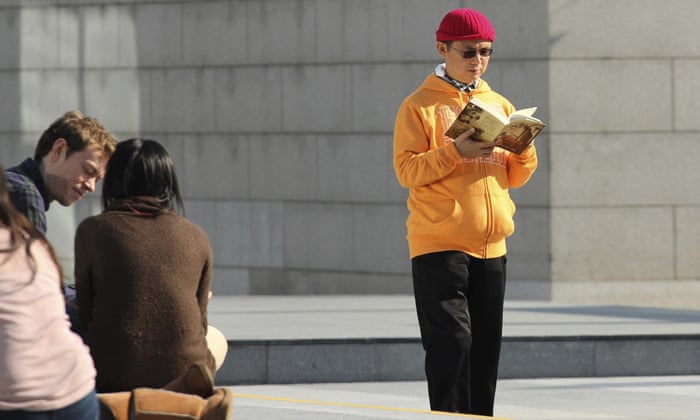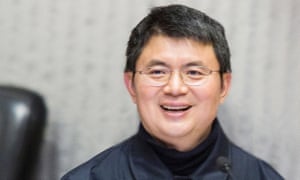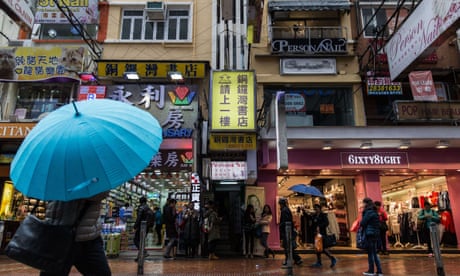By Benjamin Haas in Hong Kong

Xiao Jianhua, a Chinese-born Canadian billionaire, reads a book outside the International Finance Centre in Hong Kong. Mystery now surrounds his exact whereabouts.
It has been more than two weeks since Xiao Jianhua last crossed the threshold of his luxury suite at the Four Seasons hotel in Hong Kong.
For a billionaire -- even one with a relatively low profile like Xiao -- to vanish would, in normal times, be alarming.
But when the place he has been sucked into is the black hole of China’s security state, nerves have become increasingly rattled.
Xiao is renowned for his close relationships and business dealings with elite families, including Xi Jinping's relatives.
For a billionaire -- even one with a relatively low profile like Xiao -- to vanish would, in normal times, be alarming.
But when the place he has been sucked into is the black hole of China’s security state, nerves have become increasingly rattled.
Xiao is renowned for his close relationships and business dealings with elite families, including Xi Jinping's relatives.
Many believed those connections made him untouchable.
His bolt hole at the Four Seasons – where suites can cost £21,000 a month – and the relatively safe environs of Hong Kong, which has a separate legal system from China, were seen as affording extra protection.
Xiao also employed multiple security firms and surrounded himself with a squad of female bodyguards who were apparently known to wipe the sweat from his brow.
His bolt hole at the Four Seasons – where suites can cost £21,000 a month – and the relatively safe environs of Hong Kong, which has a separate legal system from China, were seen as affording extra protection.
Xiao also employed multiple security firms and surrounded himself with a squad of female bodyguards who were apparently known to wipe the sweat from his brow.

University of Hong Kong photo of Xiao Jianhua, founder of Beijing-based Tomorrow Group.
But all that changed when he was seen being led away in a wheelchair by plain clothes Chinese security agents, his head covered by a sheet, and taken across the border into China, possibly by boat to avoid immigration checks, according to a report in the New York Times.
As Hong Kong prepares to mark the 20th anniversary of its handover from Britain to China, Xiao’s case, like the disappearance of five booksellers a little more than a year ago, highlights the erosion of promised freedoms and autonomy, and threatens to undermine the territory’s global reputation.
“There’s an increasing tendency of Hong Kong becoming more and more like just another Chinese city,” said Anson Chan, the former lawmaker and number two official in Hong Kong.
As Hong Kong prepares to mark the 20th anniversary of its handover from Britain to China, Xiao’s case, like the disappearance of five booksellers a little more than a year ago, highlights the erosion of promised freedoms and autonomy, and threatens to undermine the territory’s global reputation.
“There’s an increasing tendency of Hong Kong becoming more and more like just another Chinese city,” said Anson Chan, the former lawmaker and number two official in Hong Kong.
“How else can we compete as a global city other than holding on to the rule of law, the independence of the judiciary and rights and freedoms, particularly freedom of expressions and free flow of information?
“These are Hong Kong’s strengths but every day we see an erosion of those strengths. The long arm of the mainland authorities reaches far and wide into Hong Kong.”
Xiao is the 32nd richest person in China, with a fortune of Y40bn (£4.7bn).
“These are Hong Kong’s strengths but every day we see an erosion of those strengths. The long arm of the mainland authorities reaches far and wide into Hong Kong.”
Xiao is the 32nd richest person in China, with a fortune of Y40bn (£4.7bn).
He has more than tripled his wealth since 2013, and many believe it is a low estimate anyway.
He controls Tomorrow Group, which has stakes in real estate, insurance, banking, coal and cement firms.
His vast wealth may have been his downfall, with the head of China’s stock market regulator saying “there must be a plan to capture and bring capital market crocodiles back to the mainland”.
Beijing will not allow tycoons to “suck the blood of retail investors”, Liu Shiyu, chairman of China Securities Regulatory Commission, said at a meeting on Friday, without directly naming Xiao. China’s stock markets experienced a politically embarrassing rout in 2015, erasing £4 trillion in stock value and severely denting the reputation of the country’s nascent markets.
Xiao helped Xi’s sister and brother-in-law dispose of assets after Bloomberg News reported on the wealth of the president’s family in 2012, and has invested in the same deals with other members of the political elite.
After Xiao was abducted, his wife filed a request for police assistance – but then tried to withdraw it and flew to Japan.
His vast wealth may have been his downfall, with the head of China’s stock market regulator saying “there must be a plan to capture and bring capital market crocodiles back to the mainland”.
Beijing will not allow tycoons to “suck the blood of retail investors”, Liu Shiyu, chairman of China Securities Regulatory Commission, said at a meeting on Friday, without directly naming Xiao. China’s stock markets experienced a politically embarrassing rout in 2015, erasing £4 trillion in stock value and severely denting the reputation of the country’s nascent markets.
Xiao helped Xi’s sister and brother-in-law dispose of assets after Bloomberg News reported on the wealth of the president’s family in 2012, and has invested in the same deals with other members of the political elite.
After Xiao was abducted, his wife filed a request for police assistance – but then tried to withdraw it and flew to Japan.
While the Hong Kong police have said they are investigating the case, sources have described the case as far above their pay grade.
Hong Kong’s business world meanwhile is reconsidering the implications of dealing with Chinese firms, especially those controlled by politically connected elites.
“There used to be a feeling that if you invested with politically powerful people you were safe, but Xiao’s disappearance shows that doesn’t work,” said a businessman in Hong Kong with extensive dealings in China who asked not to be named.
Hong Kong’s business world meanwhile is reconsidering the implications of dealing with Chinese firms, especially those controlled by politically connected elites.
“There used to be a feeling that if you invested with politically powerful people you were safe, but Xiao’s disappearance shows that doesn’t work,” said a businessman in Hong Kong with extensive dealings in China who asked not to be named.
“A lot of people are wondering: if I can get snatched from my home in the middle of the night, is this worth it?”
Many saw Hong Kong as a sanctuary.
Many saw Hong Kong as a sanctuary.
As part of the agreement for the UK to transfer sovereignty to China, Hong Kong maintains separate laws, banking regulations and freedoms not found on the mainland, under an arrangement known as “one country, two systems”.
Under that agreement Chinese police are forbidden from operating in the city.
“For anyone that has illusions Hong Kong is some kind of safe haven, they are lying to themselves. If China wants to arrest you, they will,” the businessman said.
“For anyone that has illusions Hong Kong is some kind of safe haven, they are lying to themselves. If China wants to arrest you, they will,” the businessman said.
“Most people just hope they can get themselves, their family and their money out of Hong Kong before the Chinese can catch up with them.”
When five booksellers – publishers of thinly sourced stories on China’s leaders – disappeared in 2015, droves of foreign businessmen lobbied consulates in the city to register their concerns with Hong Kong and Chinese authorities.

In Hong Kong's book industry, everybody is scared
“This is the darkest time for Hong Kong’s human rights and freedom,” said Nathan Law, a lawmaker and member of the legislature’s security committee.
When five booksellers – publishers of thinly sourced stories on China’s leaders – disappeared in 2015, droves of foreign businessmen lobbied consulates in the city to register their concerns with Hong Kong and Chinese authorities.

In Hong Kong's book industry, everybody is scared
“This is the darkest time for Hong Kong’s human rights and freedom,” said Nathan Law, a lawmaker and member of the legislature’s security committee.
“We used to think being taken away in the middle of the night would only happen in mainland China, but it happens in Hong Kong now.
“With the current government, and Xi Jinping leading China, the situation has gotten worse, and every Hong Kong citizen can feel it,” he added, saying there had been a rapid deterioration in the past five years.
Some constituents have told Law they are considering emigrating in light of the recent disappearance as they no longer feel safe.
“With the current government, and Xi Jinping leading China, the situation has gotten worse, and every Hong Kong citizen can feel it,” he added, saying there had been a rapid deterioration in the past five years.
Some constituents have told Law they are considering emigrating in light of the recent disappearance as they no longer feel safe.
Leaving the city has long been a backup plan for wealthier residents, with massive waves of emigration following the 1989 Tiananmen Square massacre and in the years leading up to the handover from Britain in 1997.
One reason for the timing of Xiao’s abduction may be a high-level Communist party meeting in October where there is set to be a shakeup in the almighty Politburo Standing Committee.
One reason for the timing of Xiao’s abduction may be a high-level Communist party meeting in October where there is set to be a shakeup in the almighty Politburo Standing Committee.
Xi Jinping, one of the most powerful leaders since Mao Zedong, has spent the past five years consolidating that power and wants to ensure there will be no interference in his plans.
Xiao’s investments with elite families mean he is privy to a host of potentially damaging information on a range of Communist party leaders.
Xiao’s investments with elite families mean he is privy to a host of potentially damaging information on a range of Communist party leaders.
And this is not the only time he has felt political heat.
When Chinese media reported he had privatised state assets below market value, Xiao moved to Canada, where he has citizenship, according to a 2014 New York Times profile.
Xiao also holds a diplomatic passport from Antigua and Barbuda as an ambassador-at-large with the power to “promote investment, trade and commerce, business and tourism development, and negotiate with the authorities and business entities of all states and territories”.
That appointment was not without controversy, with an Antiguan opposition politician alleging Xiao was given 200 passports to dole out as he wished.
There has been no official comment from China on Xiao’s disappearance and many still wonder what exactly he might have done.
“There are many powerful businessmen in Hong Kong, they could cross an unknown red line at any moment, and there are more and more of these red lines,” said Law, the outspoken pro-democracy lawmaker.
“Maybe one day I’ll cross a line without knowing and then the next day I won’t be in Hong Kong. That threat indeed exists.”
Xiao also holds a diplomatic passport from Antigua and Barbuda as an ambassador-at-large with the power to “promote investment, trade and commerce, business and tourism development, and negotiate with the authorities and business entities of all states and territories”.
That appointment was not without controversy, with an Antiguan opposition politician alleging Xiao was given 200 passports to dole out as he wished.
There has been no official comment from China on Xiao’s disappearance and many still wonder what exactly he might have done.
“There are many powerful businessmen in Hong Kong, they could cross an unknown red line at any moment, and there are more and more of these red lines,” said Law, the outspoken pro-democracy lawmaker.
“Maybe one day I’ll cross a line without knowing and then the next day I won’t be in Hong Kong. That threat indeed exists.”
Aucun commentaire:
Enregistrer un commentaire